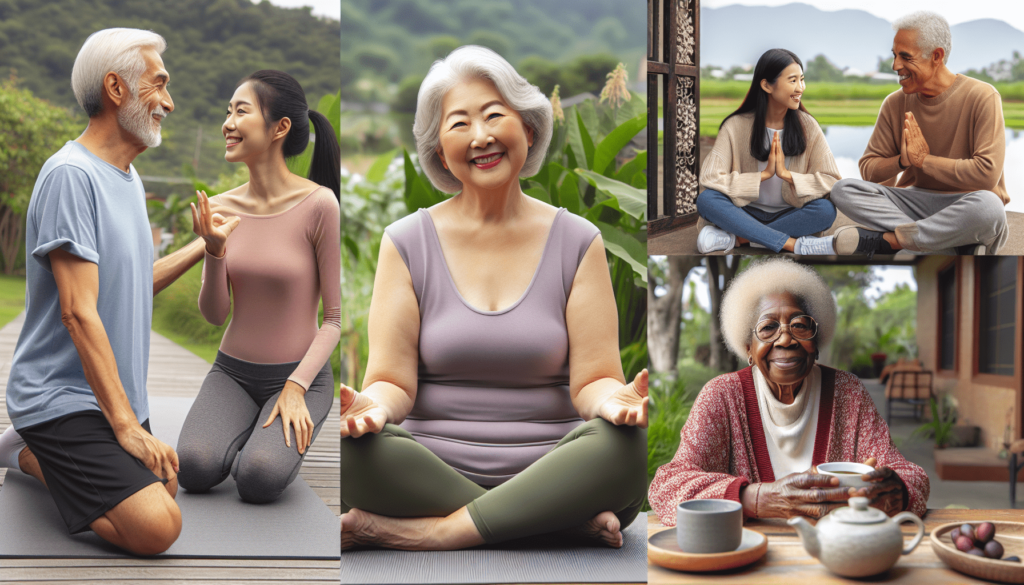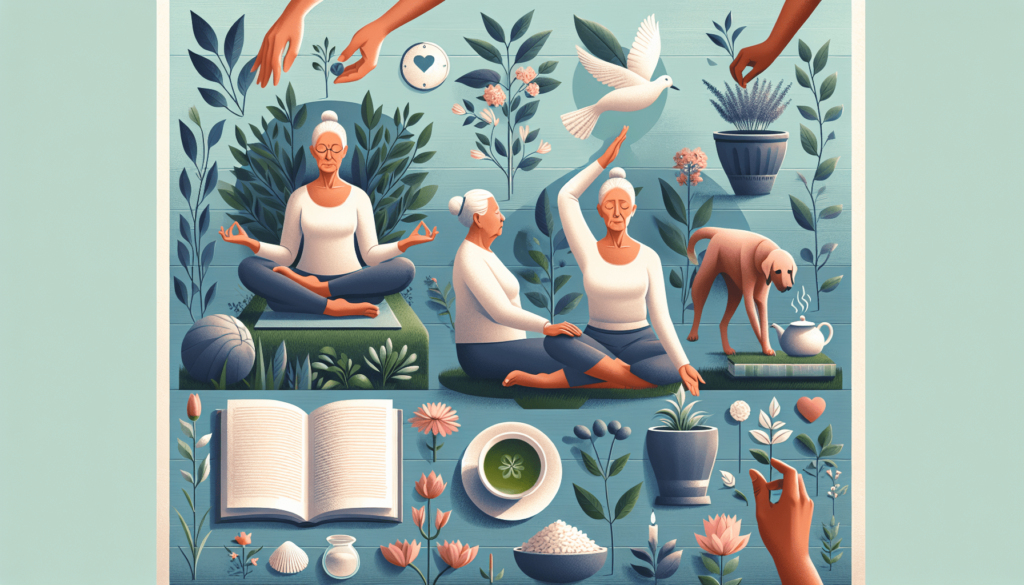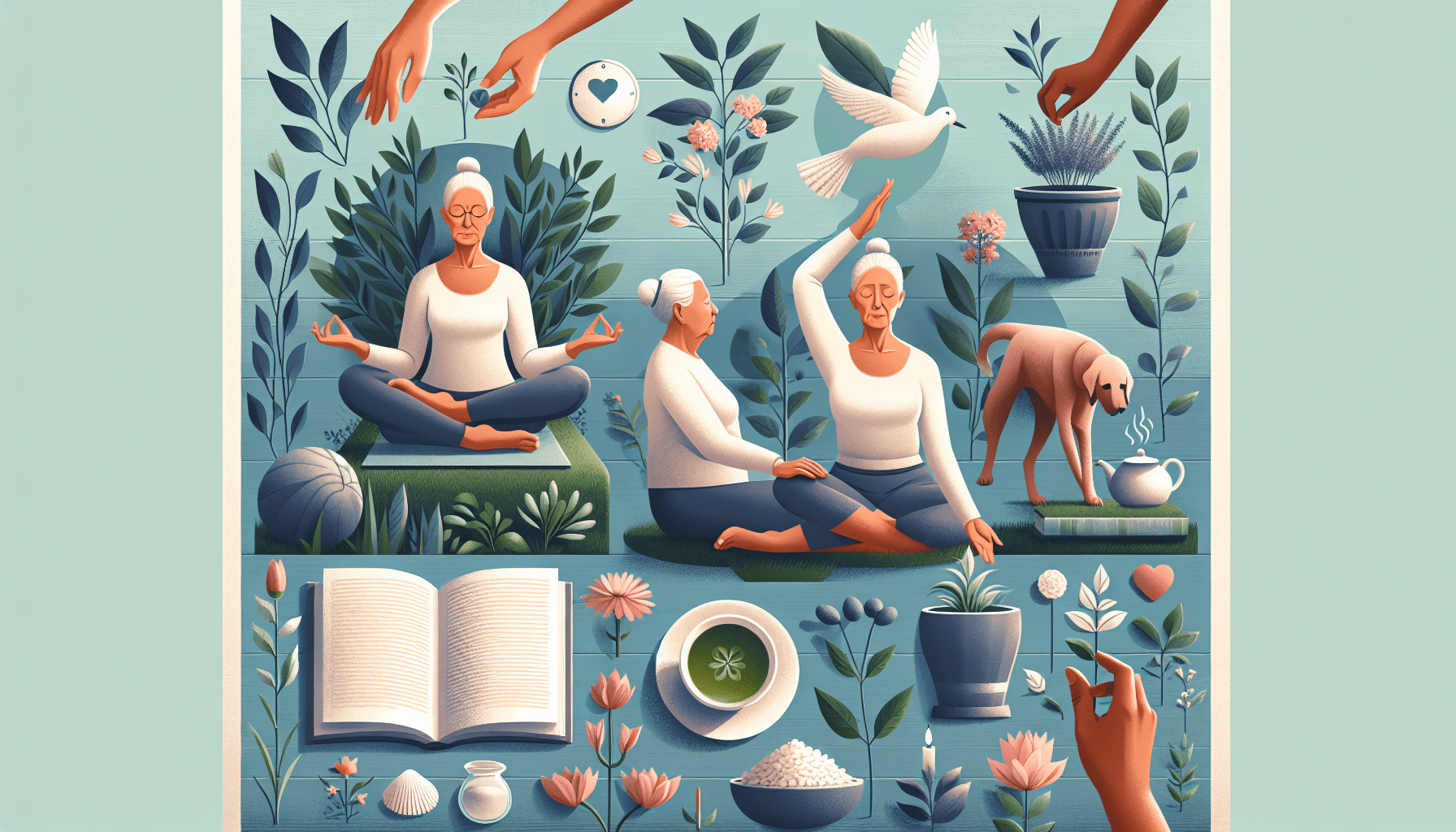As you navigate through the journey of life, one thing is inevitable: aging. But rather than being afraid of the passing years, why not embrace them gracefully? In this article, discover a variety of holistic strategies that can help you age gracefully, both physically and mentally. From adopting a healthy lifestyle to cultivating mindfulness and self-care practices, you’ll find valuable insights and practical tips to support your journey towards aging with grace and vitality. So, grab a cup of tea, settle into a cozy chair, and let’s embark on a holistic approach to aging that celebrates the beauty and wisdom that come with each passing year.
Physical Fitness
Regular exercise is an essential component of maintaining a healthy and vibrant body as you age. Engaging in physical activity on a regular basis helps to improve cardiovascular health, increase muscle strength, and enhance flexibility. It is recommended to aim for at least 150 minutes of moderate-intensity aerobic exercise or 75 minutes of vigorous-intensity exercise per week. This can include activities such as brisk walking, swimming, cycling, or dancing. Remember to start slowly and gradually increase the intensity and duration of your workouts.
Strength training is equally important, as it helps to preserve muscle mass and bone density. Incorporating exercises that target all major muscle groups, such as weightlifting or using resistance bands, can help maintain strength and mobility. Flexibility exercises, such as stretching or yoga, are also beneficial in preventing stiffness and improving range of motion. Make sure to consult with a healthcare professional or fitness trainer before starting any new exercise regimen to ensure safety and proper form.
Cardiovascular activities are particularly beneficial for maintaining heart health and respiratory function. Engaging in activities that raise your heart rate, such as jogging, cycling, or aerobic classes, can help improve circulation and oxygen flow throughout the body. Aim for at least 30 minutes of moderate-intensity cardiovascular exercise most days of the week. Remember, finding activities that you enjoy will make it easier to stick to a regular exercise routine.
Nutrition
Maintaining a well-balanced diet is crucial for optimal health and longevity. Eating a variety of nutrient-dense foods from all food groups ensures that your body receives the necessary vitamins, minerals, and macronutrients it needs to function properly. A balanced diet should include a variety of fruits, vegetables, whole grains, lean proteins, and healthy fats.
Adequate hydration is also essential as you age, as it helps maintain proper bodily functions and supports overall well-being. Aim to drink at least eight cups (64 ounces) of water per day, and more if you are physically active or in hot weather. Remember that other beverages, such as herbal teas or infused water, can contribute to your daily fluid intake as well.
Superfoods are nutrient-packed foods that offer numerous health benefits. Incorporating superfoods into your diet can help boost your immune system, reduce inflammation, and provide essential nutrients. Some examples of superfoods include berries, leafy greens, nuts and seeds, fatty fish, and whole grains. Aim to include these foods in your meals and snacks regularly.
Supplementation may be necessary to ensure adequate intake of certain nutrients, especially as you age. Talk to your healthcare provider about taking supplements such as vitamin D, calcium, or omega-3 fatty acids to support bone health and overall well-being. Remember that supplements should not replace a healthy diet, but rather complement it.

Stress Management
Effective stress management techniques are vital for overall well-being and can greatly impact your quality of life. Incorporating practices such as meditation, deep breathing exercises, yoga, and mindfulness can help reduce stress levels and promote relaxation.
Meditation is a powerful technique that involves focusing your attention and eliminating the stream of thoughts that may be causing stress. Taking just a few minutes each day to sit quietly, close your eyes, and focus on your breath can bring a sense of calm and clarity.
Deep breathing exercises involve intentionally taking slow, deep breaths to activate the body’s relaxation response. This technique can be done anywhere, at any time, and provides immediate stress relief.
Yoga combines physical postures, breathing exercises, and meditation to promote relaxation, flexibility, and strength. Practicing yoga regularly can help reduce stress, improve sleep quality, and enhance overall well-being.
Mindfulness practice involves being fully present in the current moment and engaging in activities with awareness. This can be achieved through activities such as mindful eating, walking, or simply pausing to observe your surroundings. Cultivating mindfulness can help reduce stress and increase overall happiness.
Sleep Quality
Getting quality sleep is crucial for overall health and well-being. Establishing a bedtime routine can help signal to your body that it is time to wind down and prepare for sleep. This can include activities such as reading a book, taking a warm bath, or practicing relaxation techniques.
Creating a relaxing sleep environment is key to promoting restful sleep. Ensure that your bedroom is cool, dark, and quiet. Consider using blackout curtains, earplugs, or a white noise machine to block any disruptive external stimuli.
Limiting electronic device use before bed is important, as the blue light emitted from screens can interfere with the production of melatonin, the hormone that regulates sleep. Aim to avoid using electronic devices, such as smartphones or tablets, at least one hour before bedtime.
Avoiding stimulants, such as caffeine and nicotine, close to bedtime is essential for promoting quality sleep. These substances can interfere with your ability to fall asleep and stay asleep throughout the night. Opt for herbal tea or decaffeinated options in the evening, and consider gradually decreasing your caffeine intake throughout the day.

Brain Health
Taking care of your brain health is essential for maintaining cognitive function and overall mental well-being as you age. Engaging in mentally stimulating activities, such as puzzles, reading, or learning a new skill, can help keep your mind sharp and improve memory.
Certain foods have been found to support brain health and cognitive function. Incorporating brain-boosting foods into your diet, such as fatty fish rich in omega-3 fatty acids, blueberries, turmeric, and dark chocolate, can provide important nutrients and antioxidants.
Social engagement is also crucial for brain health. Maintaining social connections, participating in group activities, and engaging in conversations help stimulate the brain and ward off cognitive decline.
It is important to understand the importance of sleep in supporting brain health. During sleep, the brain undergoes essential processes that consolidate memories and support overall cognitive function. Prioritizing adequate sleep, typically between 7-9 hours per night, can greatly benefit brain health.
Skin Care
Taking care of your skin is important for both its health and appearance. Establishing a regular skincare routine that includes cleansing, moisturizing, and protecting your skin can help maintain its elasticity and reduce the signs of aging.
Sun protection is crucial in preventing premature aging and reducing the risk of skin cancer. Apply a broad-spectrum sunscreen with an SPF of at least 30 before heading outdoors, even on cloudy days. Remember to reapply throughout the day, especially if you are sweating or swimming.
Hydration plays a significant role in maintaining healthy skin. Drinking plenty of water and using moisturizers can help keep your skin hydrated, preventing dryness and promoting a youthful appearance.
Natural remedies, such as using essential oils or herbal infusions, can provide additional benefits for your skin. Incorporating ingredients like aloe vera, rosehip oil, or green tea into your skincare routine can nourish and rejuvenate your skin.
Remember that everyone’s skin is unique, so finding the right skincare products and routines may require some trial and error. Consulting with a dermatologist can help guide you in creating a skincare routine tailored to your specific needs and concerns.
Social Connections
Maintaining social connections throughout your life is crucial for overall well-being and happiness. Close relationships with family and friends provide emotional support, companionship, and a sense of belonging. Make an effort to regularly reach out to loved ones, whether it’s through phone calls, video chats, or in-person visits.
Joining social groups or clubs can also be a great way to meet new people and engage in activities you enjoy. Seek out organizations with shared interests, such as book clubs, sports teams, or hobby groups. This not only provides opportunities for social interaction but also allows for personal growth and the development of new skills.
Volunteering is a wonderful way to give back to your community while also benefiting your own well-being. Whether it’s a local charity, animal shelter, or community center, volunteering can provide a sense of purpose, fulfillment, and social connection.
Connecting with your community, whether it’s through attending local events, supporting small businesses, or participating in community initiatives, can foster a sense of belonging and strengthen social bonds. Consider getting involved in neighborhood activities or joining local organizations to enhance your sense of community.
Emotional Well-being
Taking care of your emotional well-being is vital for overall health and happiness. Expressing emotions in a healthy way, whether it’s through talking to a trusted friend or journaling, can help relieve stress and promote emotional well-being.
Therapy or counseling can provide valuable support for managing and processing emotions. A trained professional can help guide you through challenging times, provide coping strategies, and offer a safe space to express your feelings.
Practicing positive affirmations involves consciously replacing negative thoughts or self-talk with positive and empowering statements. Repeat affirmations such as “I am worthy,” “I am resilient,” or “I am deserving of love and happiness” to cultivate a positive mindset.
Practicing gratitude involves acknowledging and appreciating the good things in your life. Regularly take time to reflect on what you are grateful for, whether it’s a loving relationship, a fulfilling career, or small moments of joy. Cultivating gratitude can help shift your focus to the positive aspects of life and improve overall well-being.
Preventive Healthcare
Regular check-ups with healthcare professionals are crucial for catching potential health issues early on and maintaining overall wellness. Schedule routine visits with your primary care physician, dentist, and other specialists as recommended to address any concerns and receive necessary screenings.
Vaccinations are essential for preventing the spread of infectious diseases and protecting your health. Make sure you are up to date with recommended vaccinations, including flu shots, pneumonia vaccines, and any others recommended by your healthcare provider.
Screenings, such as mammograms, colonoscopies, and cholesterol checks, can help detect health issues before they become more serious. Discuss with your healthcare provider which screenings are appropriate for your age and individual risk factors, and follow their recommendations.
Taking preventive measures to avoid disease is essential for maintaining overall health. This can include practicing good hygiene, washing hands regularly, maintaining a healthy weight, managing chronic conditions, and avoiding risky behaviors such as smoking or excessive alcohol consumption.
Holistic Therapies
Holistic therapies can provide additional support for overall well-being by addressing the mind, body, and spirit. Acupuncture, a traditional Chinese medicine practice, involves the insertion of thin needles into specific points on the body to promote balance and healing. It has been shown to be effective in managing pain, reducing stress, and improving various health conditions.
Massage therapy involves the manipulation of soft tissues in the body to alleviate tension, reduce pain, and promote relaxation. Regular massages can help improve circulation, relieve muscle soreness, and enhance overall well-being.
Chiropractic care focuses on the relationship between the spine and the nervous system, using manual adjustments to promote proper alignment and enhance health. Chiropractic treatments can help alleviate pain, improve mobility, and support overall wellness.
Herbal remedies have been used for centuries to promote health and treat various ailments. From herbal teas and tinctures to herbal supplements, incorporating these remedies into your wellness routine can provide additional support for your overall well-being. It is important to always consult with a qualified practitioner before using herbal remedies to ensure safety and proper usage.
By incorporating these holistic strategies into your daily life, you can age gracefully and enjoy a healthier and more fulfilling life. Remember, it’s never too late to start implementing healthy habits. Take small steps towards incorporating these practices, and over time, you will notice the positive impact they have on your well-being. Cheers to aging gracefully and living your best life!

